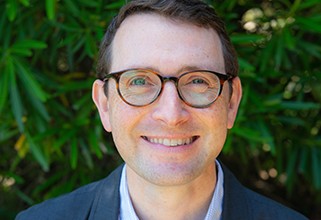Clergy Column by Rabbi Heath Watenmaker

Rededicating Ourselves to Gratitude
November/December 2024
Back in 2013, there was a lot of excitement around the celebration of “Thanksgivukkah.” Named, of course, for the coinciding holidays of Thanksgiving and Chanukah. There’s even a Wikipedia page dedicated to this momentous occasion. As a rabbi, I kind of loved it. First, it got lots of people talking about Chanukah, and, instead of focusing on the “December Dilemma” — the tensions between Chanukah and Christmas, the tensions of celebrating our Jewishness in a secular world — instead, it focused on the themes of gratitude, family and “rededication” to those things we hold most dear, inherent in our Festival of Lights. This year, of course, Chanukah falls later in the calendar, with our first candle being lit on December 25.
Every year, as we look at the calendar, we might have the following conversation when looking at the dates for the upcoming Jewish holidays: “Gee, it seems like Rosh Hashanah is really early this year,” or “Can you believe how late Passover is?” or, my personal favorite, “Can Chanukah really start that close to Thanksgiving?!?” We often wonder if the holidays are early or late, but they are, in fact, right on time, every year. They’re not bound to the calendar that we live our lives in — they belong to the sacred time of the Hebrew calendar. Rosh Hashanah is never early or late — it is always on the First of Tishrei. Passover is always on the Fifteenth of Nisan.
But Chanukah is late, even in the Hebrew calendar. While it falls on the twenty-fifth of Kislev every year, it feels late. Most Jewish holidays — particularly Sukkot, Passover and Shavuot, fall in the middle of the Hebrew month — when the moon is full and bright in the sky. But the full moon of Kislev comes and goes, and still, no Chanukah. Chanukah does not arrive until the darkest, coldest days of winter — the days when we need Chanukah most of all.
Chanukah comes at exactly the right moment — it is the Festival of Light, bringing light and warmth into our darkest, coldest nights. When we reach the point in winter that feels like spring will never appear, as Jews, we light a candle in the darkness and we hope. We celebrate. We make latkes, sing songs and spin dreidels. We gather around the warmth of the candlelight with our families, warming ourselves with the presence of our loved ones.
In a Talmudic debate (Shabbat 21b) on how we should go about lighting candles, Hillel and Shammai, the quintessential Jewish sparring partners, had typically opposite approaches. The school of Shammai argued that we should light all eight candles on the first night of Chanukah, and then remove one candle each night. Hillel, however, argued that we should light one additional candle each night, until we have all eight lit by the end of the holiday. Why? Hillel argued that we should always ascend in matters of holiness, that we add to holiness, but don’t diminish it. We increase our light and our joy.
With each night of Chanukah, as the days get shorter and the nights get longer, we increase the light, adding one candle each night. Adding to our joy and our hope and warmth — giving us the light we need to really see each other and be present with each other. What a wonderful gift we find in Chanukah: to take the darkest nights and fill them with light; to take the most difficult of our days and find ways to add a little lightness, and then to make the effort to increase that light gradually. When are the times that we could use a little more light? Is it after a long week of work? Maybe after a stressful week of school? Perhaps after a few days of rain or gray weather?
In every year, there are moments when we could use a little extra light. In the haftarah for the Shabbat that falls during Chanukah, we are told that honor will come to us “Not by might nor by power, but by spirit alone” (Zechariah 4:6). Even though the story of Chanukah is one of great military might, we focus on the miracle of light — on the triumphant spirit of Jewish life. We focus on light and not darkness. We are a people of light; a light unto the nations.
Rabbi Heath Watenmaker
rabbi_watenmaker@betham.org

 We strive to live as a holy community whose study and practice of Judaism inspires and challenges us to "do justice, to love kindness and to walk humbly with our God" (Micah 6:8).
We strive to live as a holy community whose study and practice of Judaism inspires and challenges us to "do justice, to love kindness and to walk humbly with our God" (Micah 6:8).